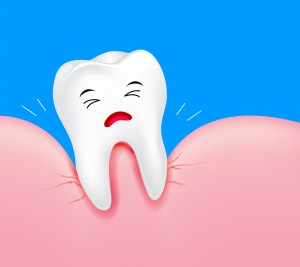 Just as you keep your house clean to maintain your overall health, so too must you care for your gums. After all, your gums are where your teeth live! If the environment in which they exist becomes infected with bacterial growth and is unhealthy, teeth can become damaged and may even fall out. So, it isn’t just for the sake of preventing gum disease that you must care for your gums — it’s also to protect the health of your teeth and your entire mouth.
Just as you keep your house clean to maintain your overall health, so too must you care for your gums. After all, your gums are where your teeth live! If the environment in which they exist becomes infected with bacterial growth and is unhealthy, teeth can become damaged and may even fall out. So, it isn’t just for the sake of preventing gum disease that you must care for your gums — it’s also to protect the health of your teeth and your entire mouth.
Yes, You Should Brush Your Gums
To prevent gingivitis, which is a disease of the gums that is caused by bacteria, you should make sure you’re brushing your gums, in addition to your teeth. Symptoms of gingivitis might include bleeding when you brush and red, swollen gums. In more extreme cases, periodontal disease may occur, where the gums start to recede and pull away from the teeth. If this happens, there is even more likelihood of bacteria forming between the gums and teeth, which can weaken the underlying bone structure. To prevent this, regularly brush your gums using a circular motion. You can use an electric toothbrush to make it easier.
Flossing for Gum and Tooth Care
Using dental floss between your teeth and gums helps to keep gums free from food particles that can attract bacteria. There are many kinds of floss, so you can choose the style that works best for you. The best dental floss is one that you’ll easily use every day.
Interdental Brushes, Oral Irrigators and Gum Stimulators
If you really want to treat your gums like royalty, there are various devices that can improve gum health. Interdental brushes are an alternative to floss, for those people who have a hard time flossing. These thin brushes are designed to fit between the teeth. Studies have shown that they’re an effective way to remove plaque. Oral irrigators (dental water jets) force water between teeth to remove debris and provide effective tooth and gum cleaning. Gum stimulators, a rubber piece with a tip on the end of a wand, typically made of metal, have a few purposes. They can help to remove stubborn food particles and plaque between the teeth. They’re also used to gently massage the gums, which promotes firmer gums and stimulates blood flow.
Gum-Healthy Foods
There are certain foods that can help maintain healthy gums. Crunchy vegetables and fruit like carrots, celery, pears and apples produces saliva, which helps to protect both teeth and gums by rebalancing the pH in your mouth. Drinking water serves the same purpose, and chewing sugarless gum also helps increase the flow of saliva.
Visit Your Dentist!
Seeing your dentist for regular cleanings and exams is also a way to be kind to your gums. Your dentist will let you know if they see any problem areas, and they can give you information about the various ways you can clean and protect your gums and your teeth for optimal oral health.







Leave a Reply